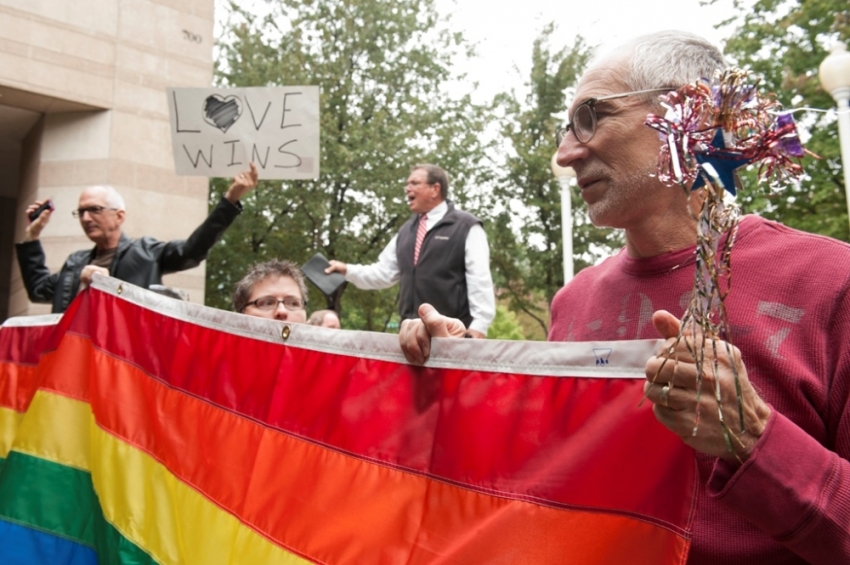Analysis: Indiana Religious Freedom Law Is Not 'Anti-Gay'

A religious freedom bill signed into law by Indiana Republican Gov. Mike Pence Thursday is being characterized by major media outlets as a codification of anti-gay discrimination. They are wrong. Here is why.
Indiana's Religious Freedom Restoration Act is a state-level version of the federal RFRA. To understand what RFRA does, it helps to first understand how the law came about.
History of RFRA
In 1989, the U.S. Supreme Court issued a ruling, Employment Division v. Smith, that was a radical departure from previous interpretations of the religious freedom clauses of the First Amendment. A member of the Native American Church was fired and denied unemployment benefits after he failed a drug test because he had consumed peyote, a hallucinogenic drug, as part of a religious ritual. The Court, in an opinion written by Justice Antonin Scalia, decided that the state did not infringe upon Smith's religious freedom because the law that Smith broke applied to all faiths, the Native American Church was not singled out.
Religious freedom advocates were outraged. They understood that if the state can infringe upon someone's religious freedom simply by passing laws that are generally applicable, religious freedom protections would be severely weakened.
What happened next is rarely seen in American politics. A broad coalition, including liberals, conservatives, civil libertarians, Jewish groups, the Christian Right, and the Christian Left, all came together to pass the Religious Freedom Restoration Act. Though there was much debate on the road to passage, by the time the bill made it to the floors of the House and Senate, it passed easily with a unanimous vote in the House and a 97-3 vote in the Senate. The bill was signed with much fanfare by President Bill Clinton, a Democrat, who would often cite it as one of the major accomplishments of his administration.
The Indiana law is a state-level version of that law. RFRA does not allow anyone to do whatever they want as long as they claim religious freedom. The law says the government can take away your religious freedom, but only if there is a compelling government interest to do so, and the government uses the least restrictive means to advance that interest.
In layman's terms, RFRA is saying that people should be left alone to live out their religious beliefs, no matter how wacky those beliefs may sound to most of us, as long as they do not interfere with legitimate government interests.
If you were to, for instance, start a "Church of the Running Red Lights," you would not be allowed to ignore traffic signals as part of your religious practice because there is a legitimate government interest in enforcing traffic laws. In sum, the state can still take away your religious freedom under RFRA, it just has to have a good reason for doing so, and saying that the government action does not target a particular religious group is not a good reason.
Yet, major news outlets are suggesting that the bill is not really about religious freedom. They do this, in part, by putting "religious freedom" in quotes, and then describe the bill as anti-gay. RFRA is not a "religious freedom" bill, it is a religious freedom bill.
Gay Rights > Religious Freedom?
Since RFRA had broad support, from Republicans and Democrats, liberals and conservatives, and an array of religious groups, how did it become controversial?
At its core, this debate is about whether gay rights trump religious freedom.
Some media outlets are misreporting that the bill would allow businesses to deny services to gays. First, the bill would not allow businesses to deny public accommodations to gays. Courts have long recognized a compelling government interest in making sure that public accommodations are open to the public.
Second, some opponents of the bill are reacting to the fact that some wedding vendors, such as florists, photographers, wedding dress designers and wedding cake bakers, have declined to serve gay weddings due to their belief that doing so would violate their deeply held religious beliefs. But in those cases, they are not declining to serve gays, they are declining to serve gay weddings.
The Case of Barronelle Stutzman

Washington state florist Barronelle Stutzman illustrates this point well. Robert Ingersoll was one of Stutzman's customers for nine years. She knew he was gay but never declined to make his floral arrangements. There was never a "no gays allowed" sign on the door to Stutzman's store. Ingersoll was a valued customer and a friend. Only after Ingersoll asked Stutzman to make the floral arrangements for his same-sex wedding did Stutzman feel conflicted.
"It was a real struggle to decide what to do with that. My husband and I talked it over, and as much as I loved Rob, I just couldn't be a part of that," she recalled.
If Washington state had a RFRA, would Stutzman's religious freedom be protected? Ultimately, that would be for a court to decide. RFRA helps ensure that religious freedom claims have their day in court, but RFRA does not guarantee any particular outcome for those claims.
To win, Stutzman would first have to convince the court that serving the gay wedding would violate her deeply held religious beliefs. To win its side of the case, Washington state would have to convince the court that it has a compelling interest in taking away Stutzman's religious freedom and it used the least restrictive means to advance that interest.
What Gay Rights Groups Really Want
In opposing RFRA, gay activist groups have demonstrated what they really want. While they used to claim a "live and let live" position, arguing that gay marriage would not affect anyone else, that is clearly not the case. Gay activist groups are trying to force those who oppose gay marriage to either go along with their agenda or be forced out of business and out of the public square.
Those who are prosecuting Stutzman are not simply putting her out of business. They are imposing fines on her that could wipe out her life savings and force her to sell her home. Similarly, Aaron and Melissa Klein in Oregon have been fined $150,000 for refusing to make a wedding cake for a same-sex wedding, a sum that will not only put them out of business, but will force them to sell their home.
The message these gay rights advocates are sending is clear: "Do as we say or we will not only force you out of business, we will destroy you." And that is why they will not support the religious freedom of gay marriage opponents.



























